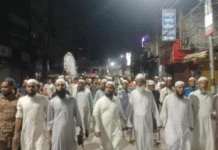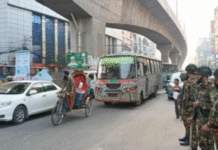AQI: Dhaka ranks 13th worst
 Bangladesh’s capital Dhaka was ranked 13th worst in the Air Quality Index (AQI) on Saturday morning, reports UNB.
Bangladesh’s capital Dhaka was ranked 13th worst in the Air Quality Index (AQI) on Saturday morning, reports UNB.
It had an AQI score of 172 at 8:43am. The air quality was classified as ‘unhealthy’. When the AQI score is between 151 and 200, everyone may begin to experience health effects while members of the sensitive groups may experience more serious health effects.
In this situation, experts recommend children, adults and people with respiratory diseases to limit outdoor exertion.
Pakistan’s Lahore, India’s Delhi and China’s Shenyang occupied the top three positions in the list of cities with worst air with scores of 337, 299 and 273 respectively.
Earlier, Dhaka ranked worst in the Air Quality Index on 17 and 23 November, and 26 December.
When the AQI value is between 201 and 300, the entire population is likely to be affected. Active children and adults, and people with respiratory diseases are advised to avoid all outdoor exertion in this situation.
The AQI is a tool for reporting daily air quality of any city or country. It tells how clean or polluted the air is, and what associated health effects might be a concern for public. The AQI focuses on health effects that one might experience within a few hours or days after breathing polluted air.
In Bangladesh, the AQI is based on five criteria pollutants – Particulate Matter (PM10 and PM2.5), NO2, CO, SO2 and Ozone (O3). The environment department also set national ambient air quality standards for these pollutants. These standards aim to protect against adverse human health impacts.
Bangladesh’s overcrowded capital has been grappling with air pollution for a long time. The quality usually improves during monsoon.
Read more:
Air pollution: Do our politicians care?
Air pollution kills Dhaka’s trees too
Dhaka’s exposure to air pollution lingers









